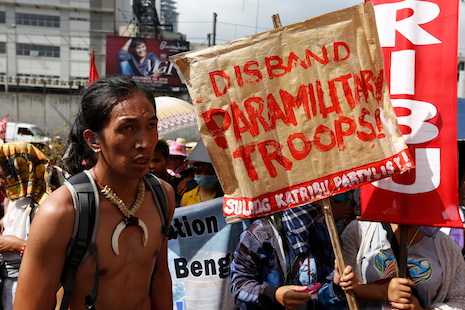
A tribesman attends a protest rally on Nov. 18 as world economic leaders meet in Manila for the Asia-Pacific Economic Cooperation summit. (Photo by Joe Torres)
The mayor of Manila wanted the 700 indigenous protesters out of a public park, where they had set up camp last month.
The reason: "Important people" were coming to the city for a global economic meeting.
Datu Isidro Indao, leader of the Matigsalug tribe of Kitawtaw, Bukidnon province, said he understood.
"They will evict us. We have no place in this city, neither as residents nor as visitors. We are not important people," he said.
The tribal people have to go or police will come with batons and water canons. The city has to be clean for the Asia-Pacific Economic Cooperation (APEC) summit delegates.
Indao smiled at the contradiction. He said the Philippines has little to offer to the economic meeting but the country’s natural resources. Unfortunately, those who will be most affected are the tribal people like him.
"They have been selling our lands. In Bukidnon, they want the lumad out of their villages to make way to mining companies. They are coercing us to convert our lands into industrial plantations," said the tribal leader.
In recent years, the indigenous people of the southern Philippine region of Mindanao, collectively known as the lumad, have been on the receiving end of threats and intimidation — pressured, they believe, to give in to the government's development plans.
"They use the military to frighten us," said Indao, adding that many tribal figures have already become victims of human rights violations and killings.
Data from the tribal group Katribu show more than 60 people have been victims of alleged extrajudicial killings since 2010.

A tribal man sits alone in a corner of a park in Manila after authorities ordered the indigenous people camped there to leave before the start of the Asia-Pacific Economic Cooperation summit. (Photo by Mark Saludes)
Not going home yet
Datu Mentroso Malibato, a Manobo tribesman, was packing his things when ucanews.com chanced upon him inside his makeshift shelter.
"We are getting ready, but we are not leaving yet," said Malibato.
He said his tribesmen will continue to try and convince people in Manila that what indigenous people are fighting for is not just for people living in remote mountains.
"The environment is at risk," Malibato said. "People who are taking care of nature are at risk.”
He said policies being discussed by APEC leaders this week would only benefit big business. "We are not stupid, we understand that," he said.
"[APEC] will bring more investors and create more profit ... but the benefits will not trickle down to poor people. We will not earn from it. Instead they will take the only thing we have: our ancestral lands," said Datu Malibato.
The tribal leader worries about his home back in the Pantaro mountain range in Davao del Norte province.
"This is one of the mountain ranges in Mindanao that is still untouched," he said.
Unfortunately for Malibato and his kinsmen, the Philippine government has already given a mining and plantation permit to Australia-based gold and copper miner Indophil Resources Ltd., to exploit the area.
Long way to go
Malibato and Indao, along with some 700 others, came to the capital in a caravan called Manilakbayan, or "Journey to Manila," hoping to raise their concerns with the central government.
A few days ago, they still believed the government would listen to them. Then the APEC rolled into town, prompting the eviction of protesters from the public park.
"We are being sold out. [The government] does not care about us," said Indao.
Rius Valle, coordinator of the Save Our Schools Network, a group lobbying for the education of indigenous children, lamented that the APEC meeting in Manila did not even listen to the "caretakers" of the environment.
"Nobody seems to care about tribal people who are continuously being displaced because of so-called development projects," Valle said.
As the protesters started leaving their camp, Datu Indao said: "We must ask ourselves, are we providing a better future for our people with the APEC meeting here?"
It was getting late on Friday, Nov. 13, but the march was just about to start. The lumads were going to the presidential palace.
"We will not stop. We want the nation to know that we are not after anything but the welfare of all people. We just want to protect our lands. APEC can’t make us stop," Indao told the marchers.
Then the police came and stopped them.
Church offers refuge
The National Shrine of Our Mother of Perpetual Help, also known as the Redemptorist Church in Manila's Baclaran district, is one of the largest Marian churches in the Philippines.
Since 1958, the Holy See has authorized the shrine to remain open 24 hours a day throughout the year. This week, the shrine has become a refuge for homeless tribesmen.
Redemptorist Brother Ciriaco Santiago said the shrine served as a sanctuary to people who lost their homes during World War II and during the years of martial law in the 1970s.
"There is nothing wrong if we offer a home to our lumad brothers and sisters," said Santiago.
He said that during a relief operation in Mindanao a few years ago, tribesmen gave shelter to church people who were caught in a storm.
"We are returning the favor," he said.
"There is no need to ask the church why it is helping the lumads," Santiago explained.
"It is our duty to accommodate all people, Catholic or not. It is our duty to fight for their rights and provide assistance if they need it," added the religious brother.
Outside the convent, the tribal men started to build makeshift shelters. The women were seen preparing something for dinner, while the children started to sing songs.


